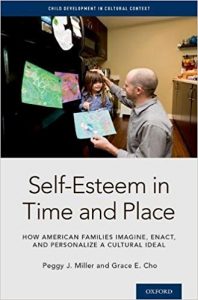Research on the Development of Self and Emotions
Located in the intersections of developmental psychology, family studies, and cultural psychology, my research focuses on how parenting and child development are situated within and impacted by sociocultural and contextual factors. How does culture shape parenting beliefs and experiences, and influence children’s self, gender, and emotional development? I have been involved in two major strands of research that investigate sociocultural variation in parenting and child development. In one line of research, I have been interested in parental folk theories, their beliefs and concerns about childrearing. For example, in one study, we examined parents’ and grandparents’ beliefs regarding young children’s self-esteem in Taiwan and the U.S. This work revealed interesting cross-cultural variation and intergenerational variation in caregivers’ beliefs about self-esteem and related childrearing practices (e.g., use of praise and disciplinary strategies). In another study, we are examining U.S. and S. Korean parents’ emotion-related beliefs and children’s emotion socialization processes. In a second line of research, I am interested in narrative as a tool for meaning-making. More specifically, I am interested in how personal storytelling, a cultural practice that many parents engage in with their children, may socialize children into cultural and emotional selves.
Our “Development of Self and Emotions Lab” (DSEL) at St. Olaf College is currently working on two projects. (1) The Parenting Beliefs and Emotion Socialization Project examines mothers’ and fathers’ beliefs about preschool-aged children’s emotion in South Korean and American families, and their responses to children’s expressions of emotion. We are also examining parent-child interactions and emotion talk during structured and unstructured storytelling activities in the lab. (2) The Life Narratives and Emotional Well-being Project examines how college students recollect and narrate the highs, lows, turning points, and meaningful events in their past. In addition to examining variations in the thematic content and emotions expressed in their stories, we examine how such variations are associated with their psychological and emotional well-being.
Dr. Cho is coauthor of Self-Esteem in Time and Place: How American Families Imagine, Enact, and Personalize a Cultural Ideal (2018). New York, NY: Oxford University Press. 
Self-Esteem in Time and Place is based on an in-depth, systematic program of research conducted with coauthor Peggy Miller on families with young children. It describes the beliefs and practices of American families as they worked with cultural ideas and ideals about self-esteem that surrounded them and reveals how self-esteem became a touchstone of American childrearing in the early years of the 21st century. We integrated research from multiple studies including longitudinal mixed-methods research with diverse caregivers and families in the Midwest, and our cross-cultural comparative research with Taiwanese families. The book was nominated for multiple book awards from scholarly associations, including the American Psychological Association’s Eleanor Maccoby Book Award in Developmental Psychology and the Society for Psychological Anthropology’s Stirling Prize for Best Published Work. The book can be ordered from the following sites:
Oxford University Press: https://global.oup.com/academic/product/self-esteem–in-time-and-place-9780199959723?q=self-esteem%20in%20time%20and%20place&lang=en&cc=us#
